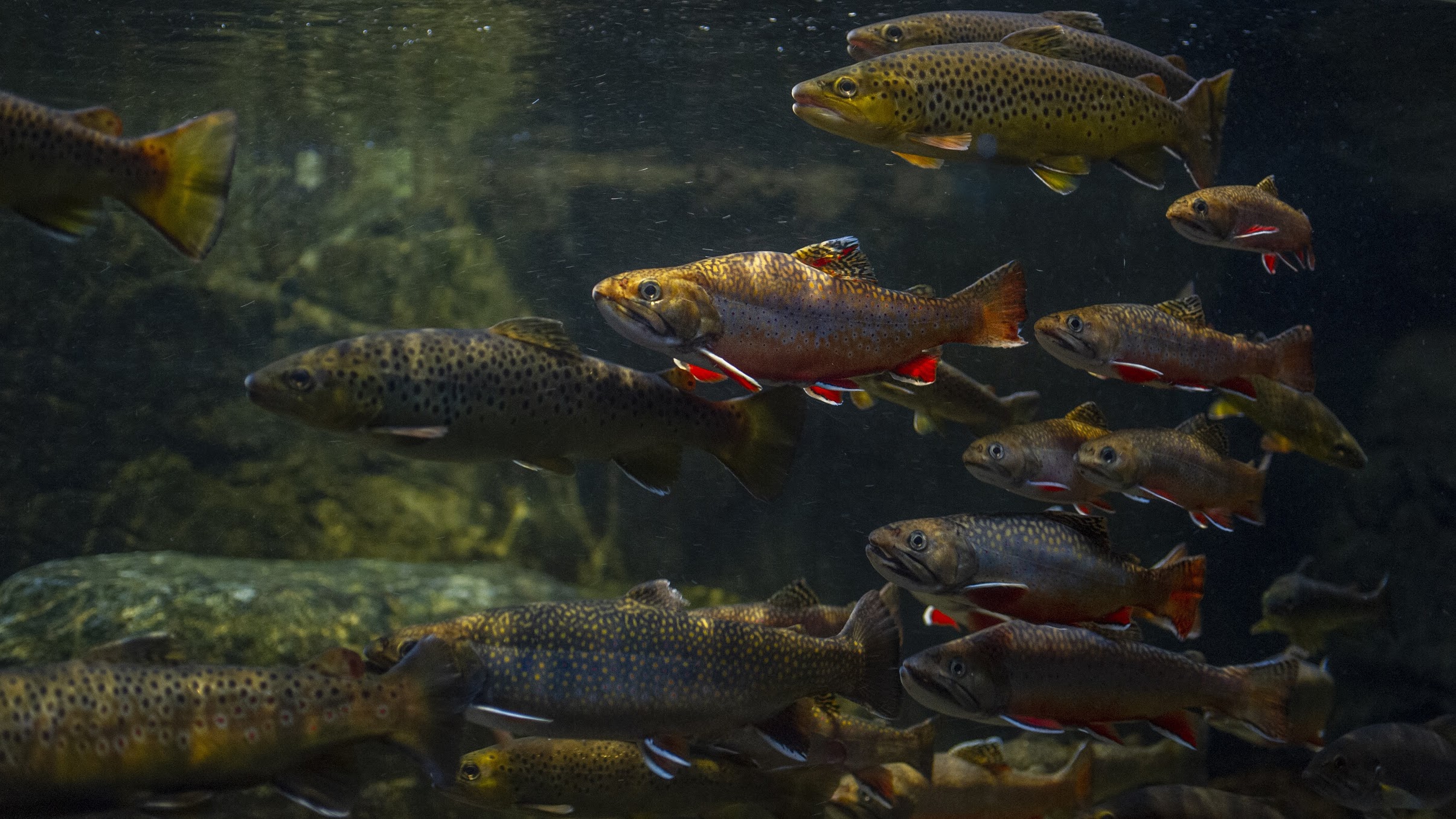As leading aquariums from around the United States committed to reducing the sources of plastic pollution that are harming our ocean and freshwater environments, we applaud the introduction of the Break Free From Plastic Pollution Act. We support the Act’s comprehensive approach to helping stem the tide of plastic pollution across the country and around the world — particularly in mountain streams, the Great Lakes, rivers, and bays, as well as our ocean waters.
Research shows plastic pollution is everywhere in the environment, from Arctic ice to the deepest ocean trenches, and that plastic is impacting the health of ocean wildlife and ecosystemsi. Each year, the deaths of more than a million seabirds and marine animals combined is linked to plastic trashii. Alarmingly, plastic use and production is increasing and vastly outpacing the nation’s ability to effectively manage plastic waste. Since people invented plastic, we have only recycled 9 percent of the plastic we have produced globally; 79 percent ended up in landfills or the natural environment; and the remainder was burnediii. An estimated 19-23 million metric tons of plastic enters aquatic ecosystems each year. If we do nothing, this amount will reach 50 million metric tons per year by 2030iv. We are also concerned about the disproportionate impacts of plastic production and pollution on communities of color and lower income communities. Acting now to reduce our dependence on plastic is a crucial step in reversing these trends.
The United States must take a leadership role in addressing the plastic pollution crisis. In the U.S., we produce over 270 pounds of plastic waste per person every year — among the highest rates in the worldv. The United States is also home to many of the top consumer brands that are packaging their products in plastic at an increasing ratevi. These facts represent significant challenges and tremendous opportunities for the U.S. to drive positive change. Tackling plastic pollution in a meaningful way will require the best science and innovation as well as concerted action by industry, government, and consumers.
The Break Free from Plastic Pollution Act would address plastic pollution by increasing industry participation in solutions, incentivizing innovation to reduce single-use plastic, and supporting next generation waste management infrastructure at the local and state level. It would also mandate attention on the need to reduce the impacts of plastic on climate change and on communities disproportionately affected by plastic production and pollution.
For the past several years, our aquariums have communicated to our more than 30 million annual visitors about the impacts on wildlife and ecosystems from plastic pollution and encouraged them to use less single-use plastic. We have conducted research that shows the prevalence of plastic in our regional ecosystems, we have helped establish plastic reduction policies in our states and communities, and we have reduced single-use plastic in our operations and worked with regional businesses to do the same. We have eliminated single-use plastic straws and plastic shopping bags in our institutions, and collectively we have eliminated more than one million plastic beverage bottles from our operations. We are currently working to phase out single-use plastic food service ware in our restaurants and cafes. More than 700 businesses — including United Airlines, the Chicago White Sox, Dignity Health hospitals, and Farmer Brothers Coffee — have made plastic-reduction commitments in collaboration with our aquariums.
Our aquariums urge Congress to advance the Break Free From Plastic Pollution Act, and we stand ready to work with government and industry leaders on bold action to reduce the causes of plastic pollution in aquatic ecosystems, in our communities and beyond.
Tara Riemer
Ph.D. President and CEO
Alaska SeaLife Center
Vikki Spruill
President and CEO
New England Aquarium
Ron Forman
President and CEO
Audubon Nature Institute of New Orleans
Craig Piper
Director of City Zoos and Interim Director
New York Aquarium Wildlife Conservation Society
Tom Stalf
President and CEO
Columbus Zoo and Aquarium
Maylon White
Division Director
North Carolina Aquariums
Roger Germann
President and CEO
The Florida Aquarium
Carrie Lewis
President and CEO
Oregon Coast Aquarium
Dr. Alistair D.M. Dove
Vice President of Research, Conservation and Nutrition
Georgia Aquarium
Alan Varsik
Director
Point Defiance Zoo and Aquarium
Jason Patlis
President and CEO
The Maritime Aquarium at Norwalk
Robert Davidson
CEO
Seattle Aquarium
Julie Packard
Executive Director
Monterey Bay Aquarium
Bridget C. Coughlin, PhD
President and CEO
John G. Shedd Aquarium
Stephen Coan
President and CEO
Mystic Aquarium
Kevin Mills
President and CEO
South Carolina Aquarium
John Racanelli
CEO
National Aquarium
Keith Sanford
President and CEO
Tennessee Aquarium
Kurt Strand
President and CEO
The National Mississippi River Museum & Aquarium
Cynthia Whitbred-Spanoulis
Executive Director
Virginia Aquarium & Marine Science Center
i Zaman et al. 2019 Advances in Science and Technology, Plastic Pollution of the Oceans: A Review of Marine Plastic Pollution and Its Environmental Impacts.
S.C. Gall, R.C. Thompson. The impact of debris on marine life. Marine Pollution Bulletin, 2015; DOI: 10.1016/j.marpolbul.2014.12.041. Schuyler et al., Risk analysis reveals global hotspots for marine debris ingestion by sea turtles, Global Change Analysis, 2015, https://doi.org/10.1111/gcb.13078. C. Wilcox, E. van Sebille, B.D. Hardesty, Threat of plastic pollution to seabirds is global, pervasive, and increasing, Proc. Natl. Acad. Sci., 2015. http://dx.doi.org/10.1073/pnas.1502108112.
ii Zaman, Md & Zaman, Rakeen & Sizemore, Robert. 2020. Plastic Pollution of the Oceans: A Review of Marine Plastic Pollution and Its Environmental Impacts. 13. 1-8.
iii United Nations. Single-Use Plastics. A Roadmap for Sustainability. 2018.
iv S.B. Borelle, J. Ringma, K.L. Law, C.C. Monnahan, L. Lebreton, A. McGivern, E. Murphy, J. Jambeck, G.H. Leonard, M.A. Hilleary, M. Eriksen, H.P. Possingham, H. De Frond, L.R. Gerber, B. Polidoro, A. Tahir, M. Bernard, N. Mallos, M. Barnes, C.M. Rochman. Predicted growth in plastic waste exceeds efforts to mitigate plastic pollution. Science, 2020: DOI: 10.1126/science.aba3656
v J.R. Jambeck, R. Geyer, C. Wilcox, T.R. Siegler, M. Perryman, A. Andrady, R. Narayan, and K.L. Law, Plastic waste inputs from land into the ocean, Science, 2015. https://doi.org/10.1126/science.1260352
vi OC&C, Flat Footed: The OC&C Global 50 2015 (2015). http://www.occstrategy.com/insights/def/flatfooted_global502015
